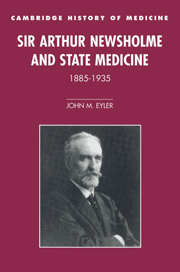Book contents
- Frontmatter
- Contents
- Illustrations
- Preface
- Abbreviations
- PART I THE MEDICAL OFFICER OF HEALTH AND THE LOCAL SANITARY AUTHORITY
- 1 The Medical Officer of Health and his town
- 2 Fact, theory, and the epidemic milieu
- 3 The urban environment and the M.O.H.'s authority
- 4 The municipal hospital and the isolation of acute infectious diseases
- 5 The epidemiology of infected food and the limits of sanitary jurisdiction
- 6 Tuberculosis: Public policy and epidemiology
- PART II NEWSHOLME AT THE LOCAL GOVERNMENT BOARD
- PART III THE OLD WORLD AND THE NEW: NEWSHOLME AS ELDER STATESMAN
- Select bibliography
- Index
- Titles in the series
1 - The Medical Officer of Health and his town
Published online by Cambridge University Press: 04 December 2009
- Frontmatter
- Contents
- Illustrations
- Preface
- Abbreviations
- PART I THE MEDICAL OFFICER OF HEALTH AND THE LOCAL SANITARY AUTHORITY
- 1 The Medical Officer of Health and his town
- 2 Fact, theory, and the epidemic milieu
- 3 The urban environment and the M.O.H.'s authority
- 4 The municipal hospital and the isolation of acute infectious diseases
- 5 The epidemiology of infected food and the limits of sanitary jurisdiction
- 6 Tuberculosis: Public policy and epidemiology
- PART II NEWSHOLME AT THE LOCAL GOVERNMENT BOARD
- PART III THE OLD WORLD AND THE NEW: NEWSHOLME AS ELDER STATESMAN
- Select bibliography
- Index
- Titles in the series
Summary
THE APPOINTMENT OF A NEW M.O.H.
On May 17, 1888, the Town Council of Brighton met to select the town's first full-time Medical Officer of Health (abbreviated M.O.H.). The position had been advertised the previous month, and there was a large field, seventy-four medically qualified men in all. A committee of councillors and aldermen cut that number first to fifteen and then to six, all of whom were then serving elsewhere as Medical Officers of Health (also abbreviated M.O.H.). After interviewing these six, the committee placed two names before the Town Council: Henry Tomkins, M.D., M.O.H., for Leicester, and Arthur Newsholme, M.D., M.O.H., for the London vestry of Clapham. At age thirty-two Newsholme was slightly younger, and unlike Tomkins, he had served only part-time for a vestry not full-time for a borough. But Newsholme made a stronger initial impression, and his supporters on the Council contended that his was the more impressive set of academic credentials. The Council was not used to judging professional qualifications, and there was much joking in the meeting about brainpower and cleverness:
We ought to take their age a little into consideration. My candidate, Arthur Newsholme, is running Henry Tomkins very close. Well, but he is five years younger (several Voices: ‘No’). Yes, he is 31, and Henry Tomkins – (after whispering with several Councillors near him) – well, he is 32, and Henry Tomkins 36, four years difference. Well, if he is 32, where will he be when he be 36? (roars of laughter). I wish him to be in Brighton (applause). A man with all those degrees at 32 is a clever man and we want the cleverest.
- Type
- Chapter
- Information
- Sir Arthur Newsholme and State Medicine, 1885–1935 , pp. 3 - 26Publisher: Cambridge University PressPrint publication year: 1997



